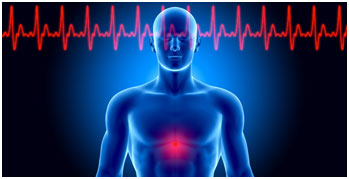Cardio-vascular illnesses
Angina Pectoris
 L’Angina (aso called angina pectoris consist of a chest pain wich appears when the cells of the heart muscle are not receiving enough blood to enable them to fulfil their task of making the pump to function properly.
L’Angina (aso called angina pectoris consist of a chest pain wich appears when the cells of the heart muscle are not receiving enough blood to enable them to fulfil their task of making the pump to function properly.
2 Billion people are suffering from angina pectoris
What is an angina pectoris ?
Angina pectoris is not a heart attack. It is an early-warning sign, nevertheless it is indicating that your risks for a heart attack, a heart still-stand or sudden death because of your heart have increased.
The pains can appear during physical activity and effort, under stress, when you are feeling being cold or an intensive heat, after a copious meal, while having alcohol or smoking.
Which are the risk factors ?
Basically, they are the same as for a coronary disease :
- confirmed menopause
- being a man
- alcohol consumption
- diabetes
- previous cases in the family
- higher blood pressure
- too high salt value
- bad physical condition
- obesity
- tobacco
Which are the symptoms ?
Angina is normally the symptom for a coronary disease. Often the symptoms of an angina are felt after an effort or an emotional stress.
Among them are:
- Feeling pain in the centre of the chest going down the left arm, the neck, the back, to the throat and the jaw
- Feeling pressure, tightness, pain in the chest
- Having the impression of slight indigestion or a severe and persisting one
- An intense pain, similar to feeling burnt or having cramps
- An upcoming pain, or one going to the throat, to the jaw, the neck, the shoulder, the back and/or the arm(s)
- A discomfort in the neck or the upper part of the back, secially between the shoulder-blades
- Feeling a numbness or loss of feeling in the arm, the shoulders
What treatments are available ?
The most current way of treating and controlling angina lie in changing of your way of living and taking drugs. Sometimes, a surgical intervention might be necessary.
Changing you way of life :
Even when physical effort can activate angina, it is very much recommended to be physically active. It is though indispensible to control the factors of risks such as: arterial high blood pressure, diabetes and hyper-cholesterol by a healthy nutrition, stopping to smoke, drinking less alcohol and to reduce your stress-level.
Drugs :
- Antiplatelet agents
- Betab-lockers
- Calcium channel blockers
Surgical interventions :
Angina also can be treated by opening a narrow artery or bypassing it, in order to bring more blood to the heart. Among the interventions for treating angina you will find :
- percutaneous coronary intervention (PCI and angioplasty and stenting)
- coronary bypass surgery



